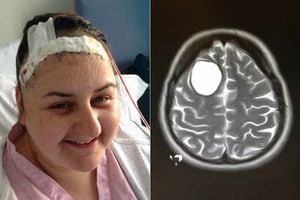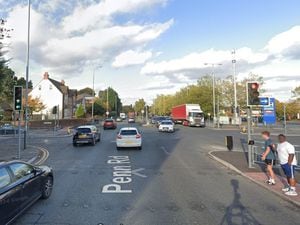Baby saved my life: Lichfield police officer's brain tumour found when she collapsed after 38-hour labour
A police officer from Lichfield has told how her baby saved her life - after doctors found a brain tumour the size of a golf ball when she collapsed following an exhausting 38-hour labour.

Just hours after West Midlands Police detective Catherine Dell, 39, gave birth to daughter Jessica she suffered a seizure - and when doctors ran tests they found the tumour on her brain.
It meant her maternity leave away from the force's Economic Crime Unit - where she tackles fraud cases and has helped put serial con artists behind bars - was spent in and out of hospital and recovering from brain surgery.
DC Dell returned to work last September having been given the all-clear and next Sunday she will be running the Lichfield Half Marathon to raise money for The Brain Tumour Charity which helped her through the ordeal. She has created a Just Giving page for anyone wishing to make a donation.

Reliving her ordeal, Catherine said: "Jessica wasn't in a rush to come out, put it that way. The labour took a total of 38 hours. It was agonising, exhausting, stressful. And a few hours after undergoing an emergency C-section I suddenly had a violent seizure.
"They ran tests and scans and they found a tumour about 4cm long on the front right-hand side of my brain. My surgeon explained that because I was so tired from labour my body's tolerance to the tumour decreased and it prompted the seizure. So in a way my daughter, and that extended labour, saved my life.
"I had no symptoms whatsoever; no headaches or eyesight problems. I would never have known.
"If my tumour had remained undetected it's likely to have continued to grow until I had a major seizure and by that stage it may have been too late. Part of it was calcified suggesting it had been there for a quite some time."
Catherine told how the discovery had turned her maternitry leave upside down.
"I assumed I'd be enjoying nine months maternity leave and embracing being a new mummy but instead I was having MRI scans, CT scans and blood tests in preparation for a craniotomy to find out what type of tumour I had.
"It was frightening. I thought it was the beginning of the end for me. My mortality was thrown into stark focus and I struggled to bond with my daughter in the fear that I was going to die and never be there for her.
"To make matters worse, after my diagnosis I was put on steroids. It was to be my best friend and my worst enemy! I put on five stones within weeks. I lost muscle in my legs and it made it impossible to climb stairs and play with Jessica."
Catherine returned to surgery on April 16 last year.
"I was back in hospital for the operation to try and biopsy my unwanted visitor. I also called it my 'critter'!" she said.
"It's a time in my life I don't recall much of now, probably for the best. With my hair shaved, an ugly stapled wound across the front of my head, and Cushing's Disease from steroids. I had no confidence. This was not what being a new mum was meant to be like.
"I was one of the lucky ones. My surgeon removed the whole tumour at the point of surgery and it turned out to be benign - a Ganglioglioma Grade 1 to be precise. It's a rare tumour normally found in about one per cent of children affected by brain tumours. It was about the size of a golf ball.
"Something people don't realise is it doesn't matter if a tumour is benign or cancerous. It comes down to location of the tumour. Someone could have an aggressive tumour in an operable position and survive whereby someone could have a low grade tumour in a position that is inoperable and eventually be terminal.
"Recovery has been long and hard. I suffered seizures from lesions left by my brain surgery. I have learnt to live with the side effects of my anti-seizure drug. My hair seemed to take forever to grow back to hide the ugly scar that remained on my scalp. I started physiotherapy to help build my muscle back."
Catherine reached a milestone in your recovery by returning to work last September.
"Going back into the office had never felt so good! " she said.
"My seizures were under control and I was passed fit to return to the unit.
"I've lost the weight and returned to be fitter and stronger than I ever was. I regained my confidence and fitness and, crucially, I've caught up on the time I lost with my daughter.
Catherine has been with West Midlands Police since 2003 and joined the Econimic Crime unit four years ago, investigating cases ranging from large scale business crime to scammers targeting vulnerable people.
"I really enjoy it. There's nothing more satisfying than playing a part in catching and jailing fraudsters and protecting people against their scams," she said.
"I'm quite a methodical person and enjoy figures and spreadsheets! Fraud is a growing crime trend that is only going to become a larger problem with the ever-expanding cyber world. For me it is like pitting your wits against some very smart people.
"Also, the Proceeds of Crime Act (POCA) means we can hit criminals where it really hurts by taking away their lavish cars, houses and lifestyle. It's probably more effective than a prison sentence!
But Catherine has not been able to go straight back into her old role.
"Not quite yet, I've returned on a 'restricted' capacity for a while and am spending time with the information management team. We review work that comes into the unit and determine what requires more digging. I was placed on this team to give me a smooth introduction back into work and investigation.
"Before my illness I was involved in some high-profile cases including a stadium manager who defrauded the club by ghosting staff and receiving their wages!
"It was also pleasing to secure a successful prosecution of a fraudster who identified victims on dating sites. He targeted gay men, befriended them and then maxed out their bank and credit cards. Some victims felt embarrassed to come forward and report the fraud - that's what the offender was banking on - but we reassured them and secured enough evidence for a conviction.
"That's something we find with fraud victims, a reluctance to report it to police as they feel embarrassed they've been duped.
"There is no need to feel this way - some of the scammers we've encountered are very plausible - and it's crucial people contact us so we can investigate. Their information could be key to making an arrest and helping protect others."
Catherine told why she is raising funds for the Brain Tumour Charity with next weekend's run.
"The Brain Tumour Charity supported me and my family through the lowest time of my life. I wanted to give something back, and raising awareness, as soon as possible," she said.
"When I was able to walk a good distance I did the Brain Tumour Twilight Walk last year - and I'm now preparing for my first half marathon on Sunday in Lichfield.
"Brain tumours are often diagnosed too late, as they cannot be felt or seen. People are still surprised when I tell them that brain tumours are the biggest cancer killer in people under 40! More needs to be done to research, diagnose and treat brain tumours.
"I've created a Just Giving page and would be hugely grateful for any donations."





